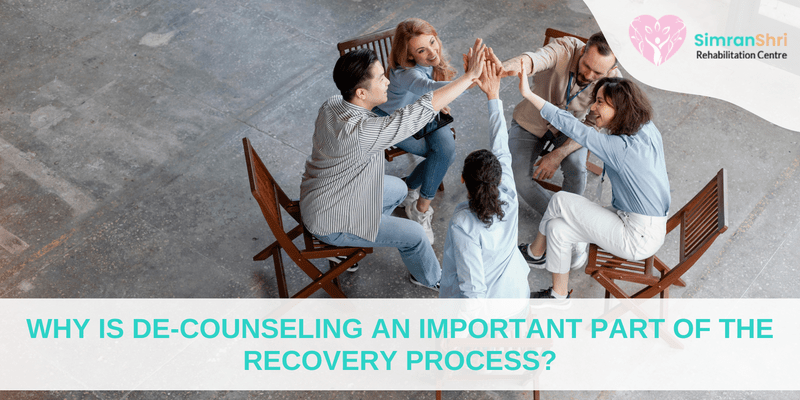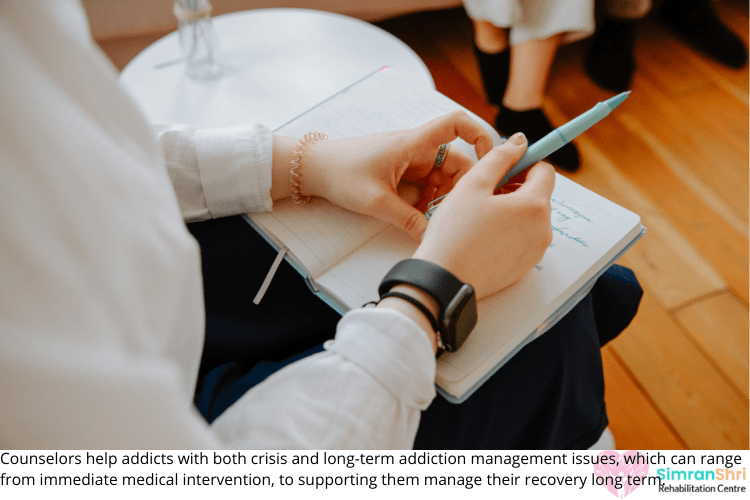

De-addiction counselling is a mainstay of addiction treatment for many people. Behavioural modification, family therapy, cognitive behavioural therapy, among many other therapies, are evidence-based therapies known to have helped individuals quit an addiction, sustain recovery and enhance overall well-being.
Addiction treatment is incomplete unless it addresses the psychological and social aspects of the disorder. The individual is likely to relapse without drug de-addiction counselling. We understand the inhibitions of the treatment seeker to open up to a stranger, but what if this "stranger" offers a judgement-free, empathetic and supportive space for you to speak your heart out? Counsellors are mental health professionals who provide the recovery seeker's necessary support system. They work hand in hand with the individual, sharing a common goal of addiction recovery and well-being enhancement.
Dive in to look into the counselling sessions to further address your apprehensions.

Addiction is much more than a mere physical dependence on substances. Even after completing a detoxification process at a Rehabilitation Centre, one is at high risk for relapse. Certain psychological and social factors act as powerful triggers resulting in relapse:
● Sudden life stressors
● Environmental cues, such as visiting a particular place
● Social circles, such as spending time with friends who abuse drugs.
These factors can stir an uncontrollable urge to use drugs in individuals. De-addiction counselling helps individuals manage cravings and overcome the perils of life stressors without taking on drugs or alcohol. A de-addiction counselling centre offers a variety of therapies to treat addictions. No one method can be deemed better than the rest. Likewise, no one treatment approach works best for every individual struggling with alcohol or drug addiction. The right treatment plan is the one that is tailored to meet the addiction and individual needs.
The decision to seek a de-addiction treatment is not easy, and it needs a great deal of trust between the recovery seeker and the counsellor. The first step in drug or alcohol de-addiction counselling is rapport formation or therapeutic alliance, where the counsellor creates a strong bond with the client.
Rapport formation is the client's trust in their counsellor, allowing them to feel comfortable discussing their problems and collaborating effectively. Developing trust takes time; recovery seekers eventually begin conversing with candour during sessions, feel a sense of relief and desire to go back after an appointment. Rapport formation is a key factor in all the Nasha Mukti Kendra procedures. By facilitating a warm and comforting environment, the counsellor can help the recovery seekers better on their road to recovery.
Recovery from addiction is challenging until the client recognizes their pattern of drug use or has ambivalence about treatment. Counsellors have little to no control over the willingness of a client to seek treatment. The counselling community continuously rethinks approaches by which a counsellor can empower and motivate the client towards achieving recovery. Counsellors often adapt to the styles of the recovery seekers to enhance their motivation through the recovery process. The counselling session is far beyond mere lending an ear, offering additive and teaching. Instead, the counsellor initially begins with helping the client recognize their problematic behaviours and then pave the way for their recovery while empowering them to do the needful for behavioural modification.
Relapse doesn't represent treatment failure; it acts as an indicator to adjust the treatment to best help an individual. Studies show that substance use disorder relapse is at par with well understood medical conditions such as asthma, diabetes, hypertension. This signifies that it is essential to curate a relapse prevention plan in drug de-addiction counselling to help sustain recovery. Preventing relapse is much more than mustering the strength to say "no" when cravings arise. These are tailored to meet the needs of the individuals; essential elements of this include:
● A detailed account of an individual's history of drug use and relapse.
● Warning signs and ways to best deal with them.
● A support network list of counsellors family, and family
● An emergency relapse plan
● Lifestyle changes prioritize an individual's well being.
A post-discharge treatment plan for ongoing care and relapse prevention is a primary feature of the best wellness centre.
Addressing the addiction is the most difficult aspect for the loved ones of an individual. They commonly ignore addressing this issue as confrontation could push their loved ones away from them. De-addiction counselling centres equip family members to handle their loved one's recovery process. Counsellors help the families in several ways, from incorporating family therapy in de-addiction counselling to finding support groups.
Family support is integral to recovery. Informed family members greatly enhance the recovery process by keeping the treatment seeker accountable. De-addiction counsellors help families understand the complexities of the recovery process and offer required support to get through the difficulties.